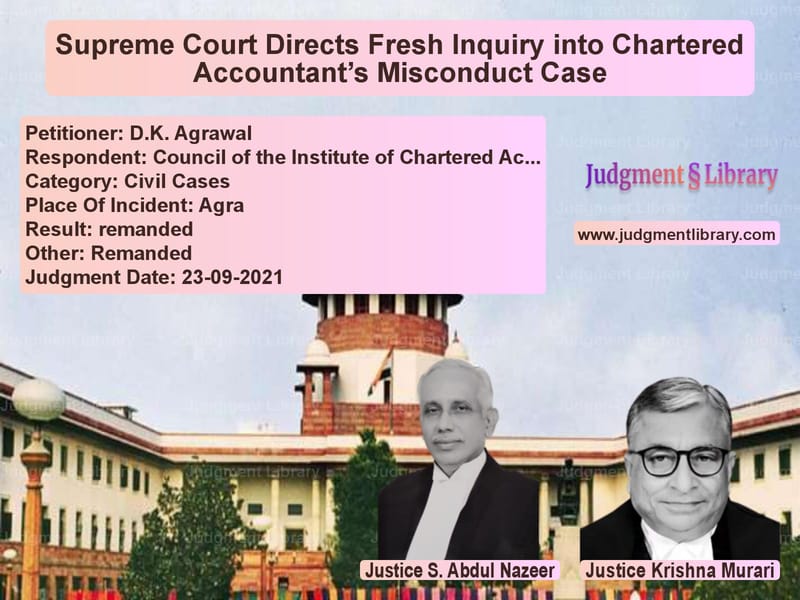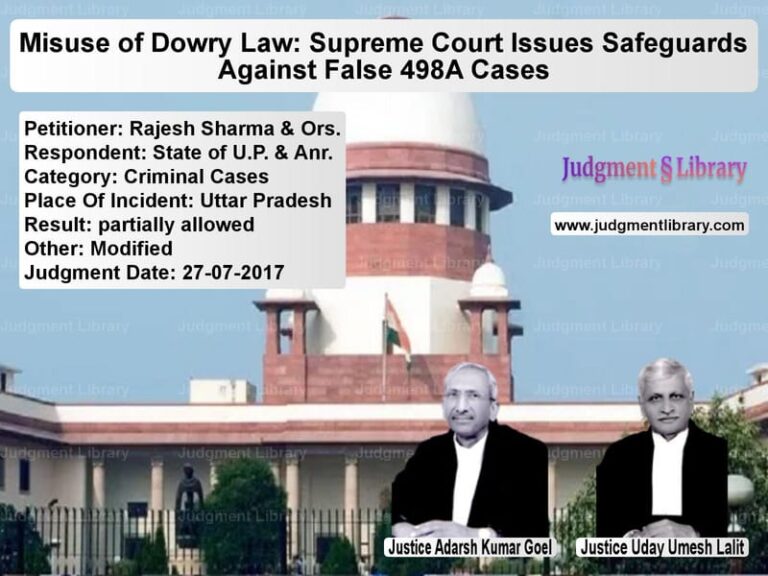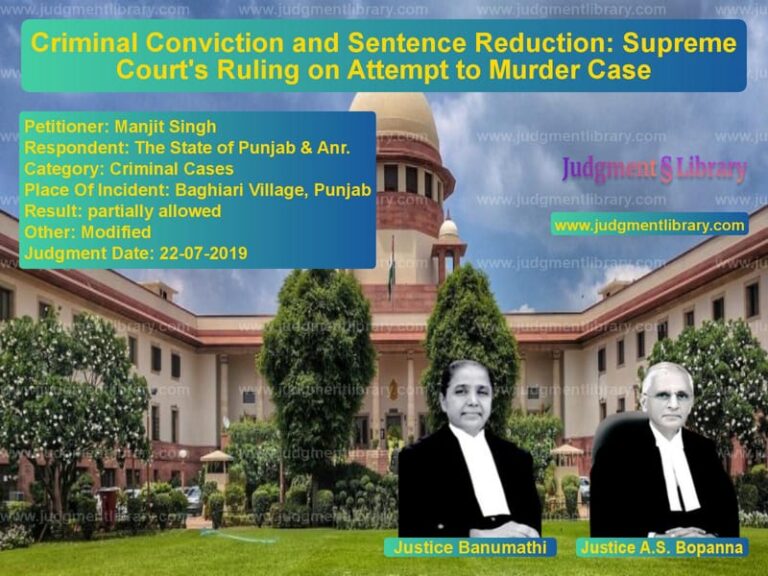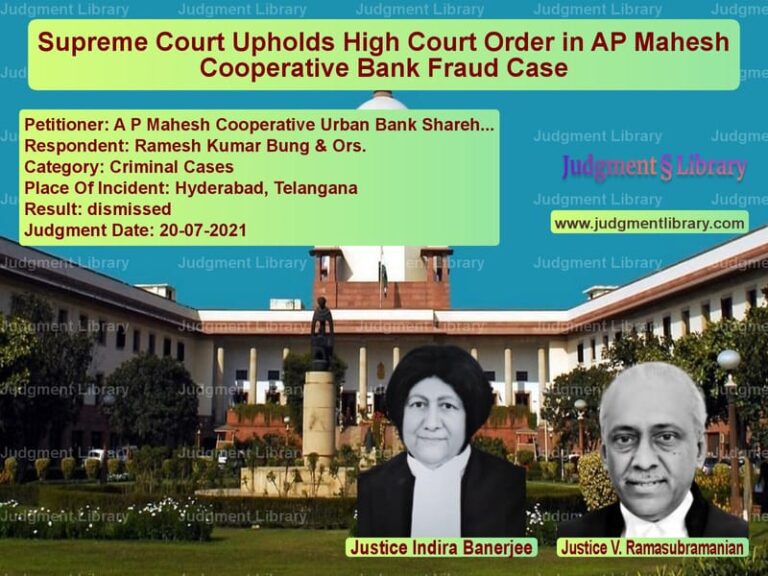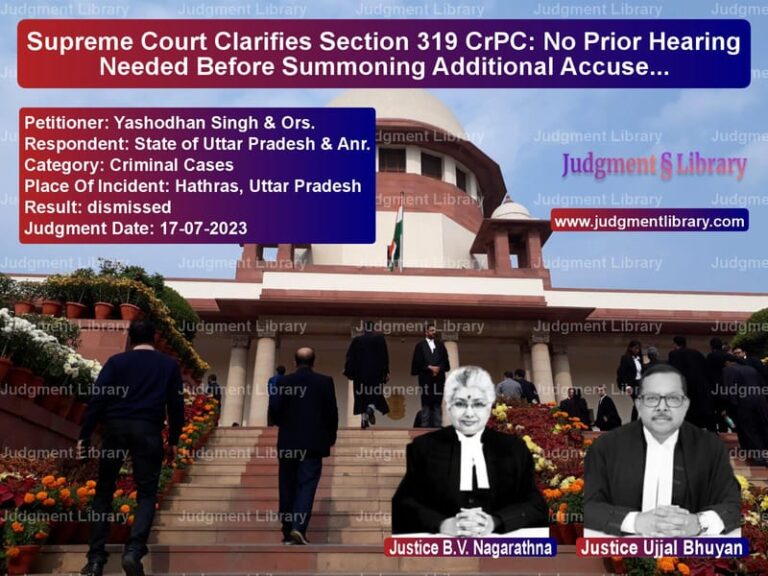Supreme Court Directs Fresh Inquiry into Chartered Accountant’s Misconduct Case
The Supreme Court of India recently ruled in a case involving a Chartered Accountant, D.K. Agrawal, accused of professional and other misconduct. The case was brought against him by the Institute of Chartered Accountants of India (ICAI), which alleged that he engaged in fraudulent financial practices, leading to disciplinary action. The dispute revolved around whether the disciplinary proceedings followed due process, with the appellant arguing that the ICAI and the High Court failed to provide adequate reasoning for their decisions.
Background of the Case
The appellant, D.K. Agrawal, is a Chartered Accountant operating under M/s. Dinesh K. Agrawal & Co. in Agra. The case against him originated from a complaint by the Office of the Inspecting Assistant Commissioner of Income Tax, which alleged that he manipulated tax payment challans to overcharge clients while depositing only partial amounts with the treasury.
The complaint detailed that:
- Agrawal deposited only the last digit of the tax amount owed by two clients—M/s. United Pulverisers and M/s. Bharat Gas Agencies—while falsely claiming the full amount from them.
- The ICAI’s Disciplinary Committee found him guilty of misconduct and recommended the removal of his name from the Register of Members for two years.
- Following a reference from ICAI, the Allahabad High Court upheld the findings but increased the penalty by ordering the removal of his name for five years.
Agrawal challenged both the disciplinary process and the High Court’s decision, leading to an appeal before the Supreme Court.
Arguments Presented
Petitioner’s Arguments
The appellant, D.K. Agrawal, raised the following objections:
- The ICAI failed to provide a reasoned order explaining how it reached its conclusion.
- The disciplinary proceedings violated principles of natural justice, as he was not given a fair opportunity to defend himself.
- The Disciplinary Committee’s findings were based on conjectures and surmises, rather than concrete evidence.
- The High Court, in upholding ICAI’s decision, did not independently evaluate the evidence but simply accepted the committee’s findings.
Respondent’s Arguments
The ICAI defended its actions with the following arguments:
- The disciplinary process was carried out as per the Chartered Accountants Act, 1949.
- Agrawal was given multiple opportunities to present his case but instead sought repeated adjournments.
- The misconduct involved a direct financial fraud, which warranted strict disciplinary action.
- The High Court acted within its powers in enhancing the penalty due to the severity of the offense.
Supreme Court’s Analysis and Judgment
The Supreme Court examined whether the disciplinary process met the standards of fairness and reasoned decision-making. Key observations included:
On Reasoned Decision-Making
“The findings by the Council constitute the determinative decision as to the guilt of the member, and because it is determinative in character, the Act requires it to be recorded.”
The Court emphasized that the ICAI and the High Court failed to provide a well-reasoned decision, which is essential for fairness in judicial and quasi-judicial proceedings.
On Principles of Natural Justice
“The Council has failed to give its own independent findings. The recommendations made by the Council are not supported by independent reasons.”
The Supreme Court found that Agrawal was not provided with a clear and reasoned explanation of his guilt, violating his right to a fair hearing.
On the Role of the High Court
“The High Court has equally erred in accepting the recommendations of the Council without applying its own logic to this aspect of the matter.”
The Court held that the High Court should have independently assessed the findings instead of merely upholding the ICAI’s recommendations.
Final Judgment
The Supreme Court set aside both the ICAI’s disciplinary decision and the High Court’s ruling. It directed the ICAI to reconsider the case afresh and complete the proceedings within three months, ensuring proper reasoning and adherence to natural justice principles.
Read also: https://judgmentlibrary.com/supreme-court-clarifies-res-judicata-in-wakf-property-dispute/
Implications of the Judgment
This ruling has significant implications for disciplinary proceedings in professional regulatory bodies:
- Ensures Transparency: Regulatory bodies must provide clear reasoning in their decisions.
- Reinforces Natural Justice: Accused professionals must be given fair opportunities to defend themselves.
- Limits Arbitrary Decisions: Courts and disciplinary authorities must independently evaluate evidence instead of rubber-stamping previous findings.
Conclusion
The Supreme Court’s decision in this case reinforces the importance of fair hearings and reasoned decision-making in professional disciplinary matters. It serves as a reminder to regulatory bodies like the ICAI that they must uphold the highest standards of procedural fairness when handling misconduct allegations.
Petitioner Name: D.K. Agrawal.Respondent Name: Council of the Institute of Chartered Accountants of India.Judgment By: Justice S. Abdul Nazeer, Justice Krishna Murari.Place Of Incident: Agra.Judgment Date: 23-09-2021.
Don’t miss out on the full details! Download the complete judgment in PDF format below and gain valuable insights instantly!
Download Judgment: d.k.-agrawal-vs-council-of-the-insti-supreme-court-of-india-judgment-dated-23-09-2021.pdf
Directly Download Judgment: Directly download this Judgment
See all petitions in Legal Malpractice
See all petitions in Contract Disputes
See all petitions in Judgment by S. Abdul Nazeer
See all petitions in Judgment by Krishna Murari
See all petitions in Remanded
See all petitions in Remanded
See all petitions in supreme court of India judgments September 2021
See all petitions in 2021 judgments
See all posts in Civil Cases Category
See all allowed petitions in Civil Cases Category
See all Dismissed petitions in Civil Cases Category
See all partially allowed petitions in Civil Cases Category

